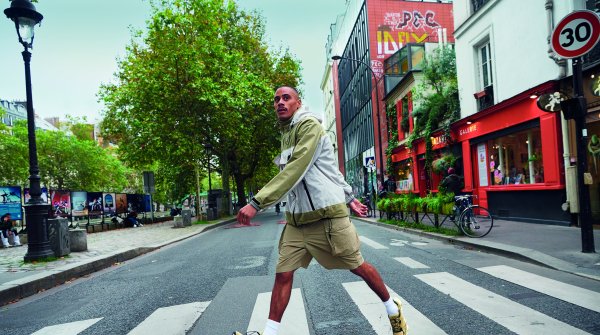The shift to a circular economy is no longer just a vision for the future; it’s becoming a necessary reality, especially for businesses looking to stay compliant with emerging EU regulations. As Europe moves towards net zero and sustainability goals, textiles have emerged as a critical focus area due to their massive waste generation and resource-intensive nature. If you want to ensure your business remains relevant and competitive in this new landscape, integrating recycled materials into your portfolio isn’t just a choice—it’s essential. (1)
The Ellen MacArthur Foundation has highlighted that the textile industry is one of the most wasteful, with clothing often used briefly and discarded. Most textiles still end up in landfills, with only a small percentage being recycled (2). However, innovative solutions like fiber-to-fiber recycling are emerging, offering businesses the chance to contribute to the circular economy, reduce waste, and support sustainability. By adopting these cutting-edge solutions, you can future-proof your business and contribute to broader global sustainability efforts. (3)(4)
Why should you care?
In Europe’s fast-evolving regulatory landscape, staying compliant with initiatives like the EU Strategy for Sustainable and Circular Textiles launched as part of the Circular Economy Action Plan (CEAP) is crucial (1). Regulations such as the EU initiative 'Ecodesign for Sustainable Products' (ESPR) emphasize that products must be designed with their entire lifecycle in mind. Companies are required to use materials that are durable, repairable, and recyclable, with a focus on reducing environmental impact both in production and during the use phase. Additionally to this, with the extended Producer Responsibility (EPR) producers will cover the costs of management of textile waste, which will also give them incentives to reduce waste and increase the circularity of textile products –designing better products from the start (6). Beyond regulatory compliance, a swift realignment also offers the opportunity to take on a pioneering role in a growing market for sustainable products and responsible business practices. Bonus: This strengthens brand image – as sustainability is increasingly becoming a decisive purchasing factor for consumers (5).
How can you actively shape tomorrow’s Circular Economy?
The eight solutions showcased at the Sustainability Hub at ISPO Munich 2024 are a prime example of how businesses can align with EU goals. These innovations are designed to reduce textile and material waste, helping your business stay ahead of the curve. From advanced recycling and dissembly technologies to recycled materials sourcing, these solutions allow companies to integrate circular practices and become active contributors to a more sustainable Europe.
Discarded fishing nets are one of the most harmful forms of ocean plastic pollution. To combat this, Bureo partners with fishing communities around the world to collect end-of-life nets, preventing them from entering the ocean in the first place. Collected nets are then recycled into NetPlus – Bureo's signature material, which can be woven or knitted into performance fabrics suitable for cold, wet, and sunny conditions, providing a high-quality feedstock option for outdoor and sports apparel brands. By replacing virgin nylon with NetPlus, brands can effectively lower their carbon footprint while supporting a responsible solution for the apparel industry.
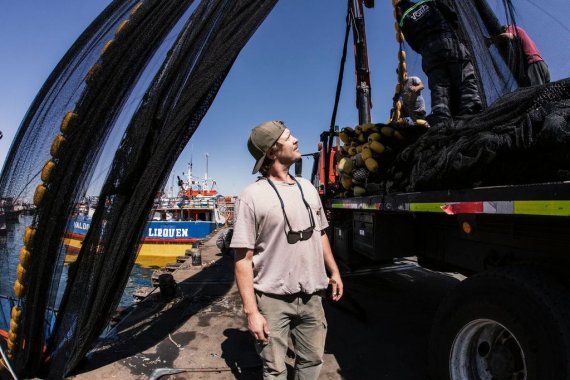
Carbon fibers are durable but generally difficult to recycle. Additionally, their production requires a significant amount of energy. Fairmat is at the forefront of sustainability in the carbon composite industry, specializing in recycling waste materials into high-quality recycled carbon composites. By leveraging advanced recycling technology, Fairmat is not only addressing the environmental impact of carbon composite waste but also promoting a circular economy across multiple sectors, including sports, electronics, mobility and energy. The company’s commitment to innovation and collaboration with industry leaders ensures that sustainability becomes an integral part of product development.

Interzero stands for sustainable ‘zero waste solutions’. To secure raw materials, the full-service provider organises innovative take-back and recycling systems for used packaging, products and materials of all kinds, including textiles. Interzero's environmental services enable producers to meet their extended producer responsibility (EPR) obligations and help save more resources. Interzero is the winner of the German Sustainability Award 2024 in the “Waste Management and Recycling Industry” category and, as a pioneer of the circular economy, provides new impulses to improve the sustainability balance in the sports business. Because climate protection is a team sport.

Since its founding in Tokyo in 1934, YKK has set industry standards for quality, service, value, and innovation in producing zippers, plastic hardware, fasteners, and more. With production and supply systems in over 70 countries, YKK meets the needs of the textile and sewing industries and has considerable scale. Central to its philosophy is founder Tadao Yoshida’s “Cycle of Goodness,” which emphasizes mutual prosperity through benefiting others. YKK is committed to initiatives like the UN Fashion Charter through innovations like Natulon Plus (more recycled material), AcroPlating technology (sustainable coating), and the Revived repair-oriented product series.
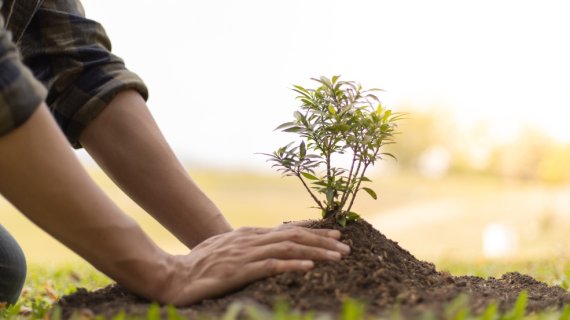
Lavalan is launching its new lavalan re wool insulation, developed in line with the zero-waste principle, fit for the biological cycle. This innovative insulation uses wool remnants from clothing production, transforming them into high-performance, natural padding. Lavalan re consists of 30 % recycled wool, 50 % virgin wool, and 20 % corn-based PLA fibers, creating a truly sustainable blend. The wool is fully traceable, mulesing-free, and sourced exclusively from Europe, with production based in Germany. By partnering with Norwegian textile specialists Devold, Gudbrandsdalens Uldvarefabrik, and Rorøs Tweed, the recycled wool is collected and processed by Sirkull, reinforcing sustainability.
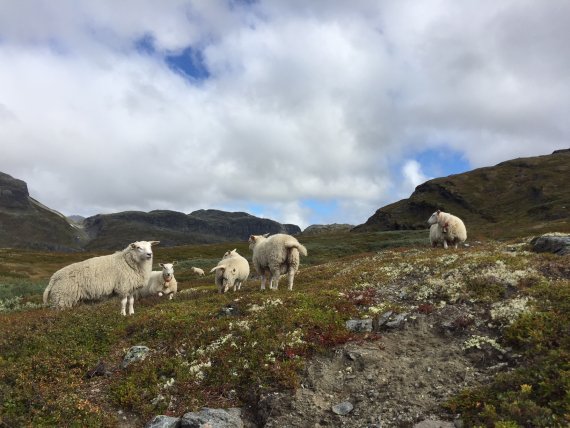
Minardi Piume, founded in 1916, is a leader in high-performance natural fillings, combining nearly a century of expertise with innovation and sustainability. As the only Italian company able to recycle down internally, Minardi Piume introduced P.U.R.E., a recycled down brand, certified and ‘Made in Italy’. The company collaborates on circularity projects, collecting and recycling post-consumer products into new high-quality fillings. Their award-winning Flower Down, made from P.U.R.E. and kapok fiber, is biodegradable and delivers exceptional thermal performance, free of added chemicals.

Re:Down recycles down and feathers from post-consumer goods for reuse as filling in apparel, sleeping bags, and bedding. Textile waste is sent to non-woven insulation producers, while broken feathers are turned into organic fertilizer. To promote zero waste, Re:Down partners with Iteratif for a circular solution in down jackets. The down is extracted with an automated machine and processed to high standards. Iteratif ensures fabrics, zippers, and buttons are dismantled and recycled, with traceability for each material. This helps brands improve recyclability and meet circularity regulations.
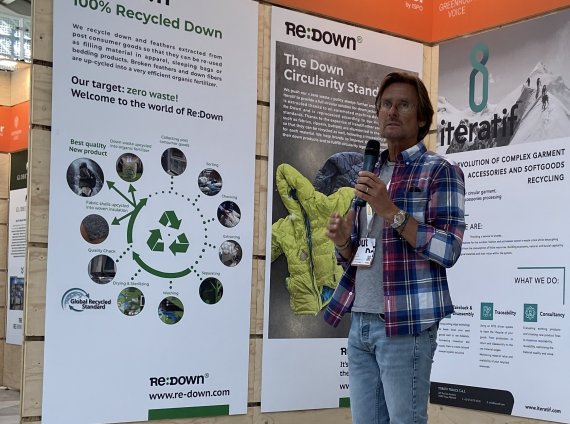
Iteratif offers consultancy services to help brands evaluate products, processes, and supply chains to enhance recyclability and reusability while maintaining material quality and value. Using advanced traceability systems like RFID, they ensure full transparency about a product's composition and lifecycle. Their cutting-edge disassembly technologies enable precise breakdown of used goods into raw materials, meeting specialist recyclers' standards. They also assess circular efficiency to guide brands in designing more sustainable products, with a focus on material and process improvements.
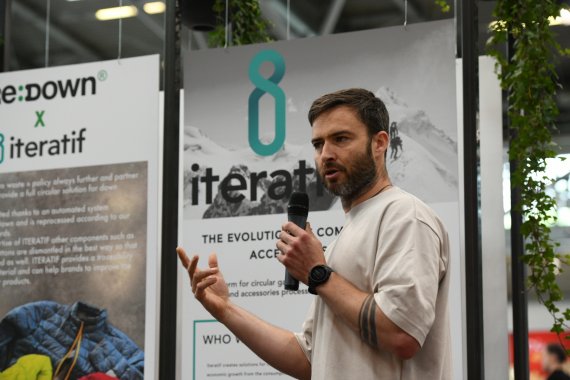
References:
- European Commission Circular Economy Action Plan and recycling targets
- Ellen MacArthur Foundation - Redesigning the future of Fashion
- European Environment Agency's home page
- ECESP - Revised Circular Economy monitoring framework
- Ecodesign for Sustainable Products Regulation
- Extended Producer Responsibility (EPR)
- Awards
- Mountain sports
- Bike
- Fitness
- Health
- ISPO Munich
- Running
- Brands
- Sustainability
- Olympia
- OutDoor
- Promotion
- Sports Business
- Textrends
- Triathlon
- Water sports
- Winter sports
- eSports
- SportsTech
- OutDoor by ISPO
- Heroes
- Transformation
- Sport Fashion
- Urban Culture
- Challenges of a CEO
- Trade fairs
- Sports
- Find the Balance
- Product reviews
- Newsletter Exclusive Area
- Magazine


